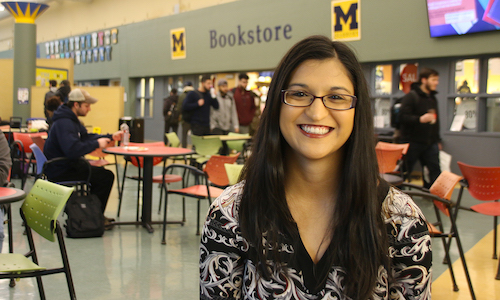
Like many, Meera Martin found inspiration in Paris. But it didn’t come from the art or the food. Instead, it came from the sounds of the city streets.
And, more specifically, the police sirens — fitting for a criminal justice and criminology major.
“It was a frequent sound, just like in our big cities here. That’s when I started to think: ‘How do they do their police report writing? What are their procedures?’” said Martin, a French minor who took the France: Sites of Memory study abroad course. “With the U.S.’s high incarceration rate, some say the U.S. has the worst criminal justice system in the world. There’s never been a golden age of criminal justice, but there’s definitely room for improvement.”
Martin, who will graduate with a Bachelor of Arts degree this month, said researching how the international community conducts police report writing is a topic she plans to study at the City University of New York’s John Jay College of Criminal Justice, where there is an international crime and justice graduate program.
“I do know that the U.S. has its own system, and I’m not trying to override that entirely; but I do think it’s important to see how other countries handle processing crime, especially with police report writing,” Martin said. “Reporting is such a huge part of our policing system. And there is not an enforced structured reporting system in place here. This can create a mess.
“As someone going into the field, I need to seek out solutions. I wondered what other countries are doing that can help us here. I want to travel, study other systems and see what we can apply to ours to improve what we have.”
Her research idea may be new, but Martin’s interest in the criminal justice field isn’t. It began with a Nate the Great book that an elementary teacher thought Martin might find interesting. She claims she wasn’t an avid reader until the detective book series.
“But I read those books carefully to make sure I didn’t miss any details. It was my introduction to criminal justice and led me to see it as a career. It also told me to always have a trusty pen at my side, to do my best and — just like Nate had his dog, Sludge — to have someone furry and fluffy that you can depend on,” said Martin, sharing that her cat’s name is Miss Maggie.
But Miss Maggie hasn’t been her only support. Martin said her professors have been an encouraging force from before enrolling on campus through today. Case in point: Sociology Associate Professor Francine Banner, who met Martin at an undergraduate open house, wrote her a letter of recommendation for graduate school.
“Dr. Banner and I had such a great conversation about law before I came here; I had such a positive impression of the program. Later, after I enrolled, I emailed her and she remembered me, recalled our conversation and asked how everything was going,” Martin said.
“I can’t say enough about the professors here. They are exceptional and come from diverse personal and professional backgrounds — women and men, different cultural backgrounds, people who have seen the system from inside the prison and out, lawyers, judges, addiction specialists, psychotherapists, federal agents. And that was important to me because all these different perspectives matter when looking at the criminal justice system as a whole.”
Martin said campus-connected experiences through student organizations like the Criminology and Criminal Justice Collective, her internship at the Michigan Council on Crime and Delinquency, completed challenges throughout the Talent Gateway and her study abroad course helped her better understand herself and her professional path.
“This campus has offered me so much,” said Martin, who will graduate with the Talent Gateway’s MTalent distinction and is a recipient of the CASL Get to Graduation Fund Scholarship. “But the most important thing that I’ve learned here is to never be afraid to ask for help. In any field, your ideas will be judged. But that’s not a negative thing. When you get feedback, ask for help on ways to improve. Show that you are committed to becoming better and people will invest in you and your ideas.”
Martin said her current focus is graduate school, but her long-term goal is to make the U.S. a more just place to live. And from the lessons she’s learned from her soon-to-be alma mater, she feels that she has a strong foundation to do that.
“Depending who you ask, the criminal justice system is either working perfectly or it is so broken that it can’t be fixed. But, just like nearly everything, it falls somewhere in between,” she said. “I know I’ll face unique challenges with both bureaucracy and the public scrutiny the system is under; but with the incredible people I’ve met and the experiences I’ve had here, I now have the tools to navigate this field in an innovative way.”




